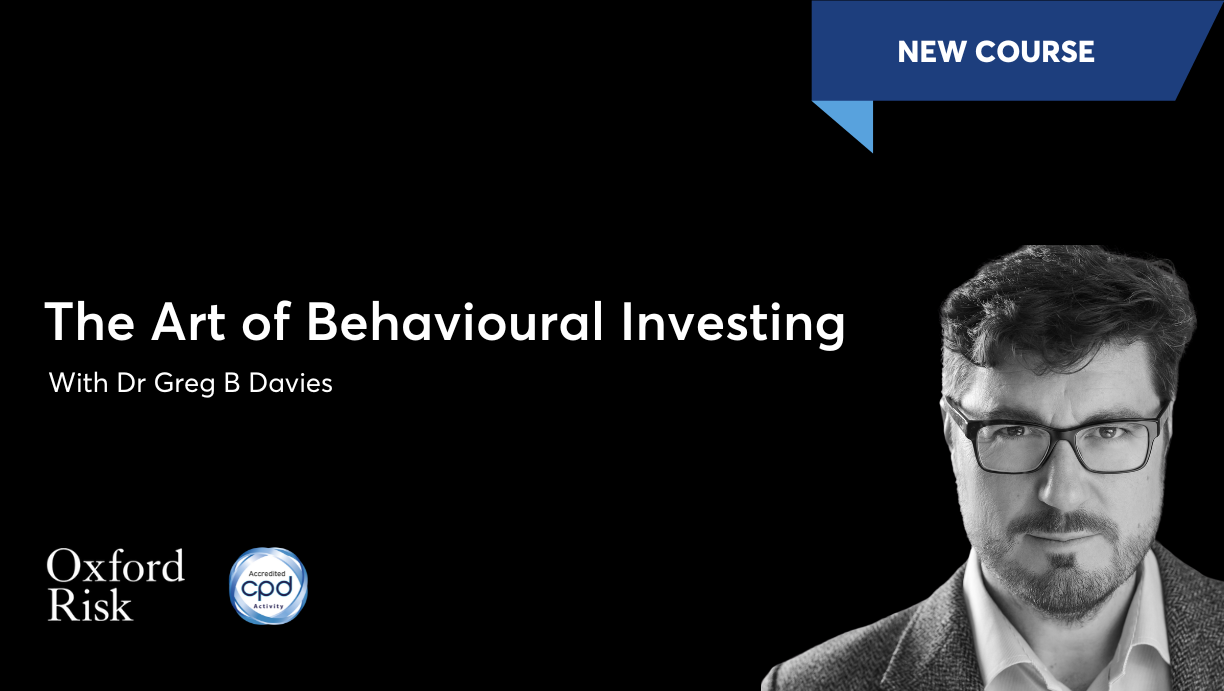The Secret To Being A Successful Investor
“The investor’s chief problem—and even his worst enemy—is likely to be himself.”
Investing is one of the most powerful tools for long-term growth.
Yet, for most of us, it feels frustrating, confusing, or even downright scary.
The irony is that the most significant challenges in investing don’t come from the stock markets themselves; they come from within.
Luckily, we are making a new course, The Art of Behavioural Investing, designed to help you overcome these challenges.
You’ll learn how psychology and behavioural biases shape your financial decisions (often leading to costly mistakes) and how to manage them effectively.
What You’ll Learn In The Art Of Behavioural Investing
This course is about understanding the human side of investing.
In the capable hands of Dr Greg B Davies, Head of Behavioural Finance at Oxford Risk, and other investment professionals, you’ll learn about:
1. The Psychology of Investing
Why we make emotional decisions and how our instincts can mislead us.
2. Common Behavioural Traps
From loss aversion to overconfidence, you’ll learn to spot the biases that sabotage investment outcomes.
3. The Emotional Journey of Investing
The highs of optimism, the lows of panic, and how to stay the course despite these emotional swings.
4. Foundational Principles for Better Investing
Practical steps you can take to reduce costly mistakes and achieve long-term success.
By the end, you’ll clearly understand the behavioural challenges you face as an investor and how to address them.
More importantly, this course will set the stage for the next step in your journey: mastering tools and techniques to implement these insights in your day-to-day decisions.
Why Behavioural Investing Matters
Traditional finance assumes we’re all perfectly rational beings who always make decisions based on logic.
The reality? We’re human.
We have emotions, biases, and unique financial personalities that influence our choices—sometimes to our detriment.
Behavioural investing bridges the gap between rational theory and emotional reality.
It provides strategies to navigate the psychological challenges of investing, helping you achieve better outcomes by working with your natural tendencies, not against them.
This course is about more than improving your portfolio; it’s about becoming a smarter, more confident investor by understanding the most critical factor in your financial success: you.
Who Is The Art of Behavioural Investing For?
New investors keen to understand their psychological blindspots
Existing Investors who want to make better decisions
Those curious about their financial personality and its impact on investing
Experienced investors refining their craft
Financial advisors who wish to improve client decisions and outcomes.
Anyone interested in the psychology behind better investing
More About Dr Greg B Davies
Greg is the Head of Behavioural Finance at Oxford Risk.
He founded the banking world’s first behavioural finance team at Barclays in 2006, which he led for a decade.
Greg holds a PhD in Behavioural Decision Theory from Cambridge, has held academic affiliations at UCL, Imperial College, and Oxford, and is the author of Behavioral Investment Management.
In other words, he’s one of the world’s most qualified people to teach you this fascinating topic.
Course Overview
Chapter 1 - An Introduction to Behavioural Investing
Lesson 1. Why Is Investing So Hard?
Lesson 2. Your Brain’s Two Thinking Systems
Lesson 3. You're Hardwired To Avoid Losses
Chapter 2 - Understanding Investors
Lesson 1. The Cost of Being Human
Lesson 2. Cost of reluctance to invest
Lesson 3. (Over)Confidence and Confirmation Bias
Lesson 4. The Costs of (Over)Confidence and Confirmation Bias
Chapter 3 - Biases Through The Investing Journey
Lesson 1. Biases Through The Journey
Lesson 2. Optimism to (irrational) exuberance
Lesson 3. Denial to panic
Lesson 4. Burnt Hands: Despondency to Reluctance
Lesson 5. Other Costs Through the Cycle
Lesson 6. The Behaviour Gap
Lesson 7. Should You Believe Investment Experts?
Chapter 4 - Understanding Investments
Lesson 1. Short-Term vs Long-Term Investing
Lesson 2. Risk vs Volatility: The Difference
Lesson 3. Luck vs Skill: The Difference
Lesson 4. Attribution Bias
Lesson 5. Market Bubbles
Chapter 5 - The 4 Golden Rules of Behavioural Investing
Lesson 1. Investing Shouldn’t Be Complex
Lesson 2. Rule No. 1: Create A Safe Environment For Investing
Lesson 3. Rule No. 2: Put The Rest To Work (Get Going!
Lesson 4. Rule No. 3: Diversify (and Invest Efficiently)
Lesson 5. Rule No. 4: Leave It Alone
Lesson 6. Anxiety Adjusted Returns
Lesson 7. Ulysses: What You Can Learn From An Old Greek Fellow
Lesson 8. How to Fix it: Implementing Practical Tools & Solutions
Don’t be your own worst enemy when it comes to investing.
Register your interest in The Art of Behavioural Investing now.






